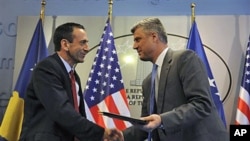U. S. Assistant Secretary of State Philip Gordon has concluded a four-nation trip through the Balkans, where he expressed concern over ethnic tensions and unresolved war crimes. He also said the U.S. does not accept the partition of Kosovo, which declared independence from Serbia in 2008.
Gordon told reporters the United States does not support Serbian calls for Kosovo to be divided along ethnic lines.
Serbian officials said recently that the partition could end a long-running dispute over Kosovo's unilateral declaration of independence from Serbia.
But speaking in Kosovo, Gordon made clear that Washington opposes redrawing Kosovo's borders.
"We in the United States have been very clear about the issue of partition," he said. "We are are not contemplating it. We are against it. We don't think it would be practical. We don't think it would be in anyone's interest."
Gordon added that Kosovo's partition would have consequences affected by the Balkan wars of the 1990s.
"And just to be absolutely clear: A Balkans region based on drawing borders around every ethnic group, would be a recipe for disaster," said Gordon.
He spoke after talks with Kosovo's Prime Minister Hashim Thaci, who is facing international controversy.
Thaci was recently accused by an investigator of the Council of Europe of involvement in war crimes.
Investigator Dick Marty said the Kosovo Liberation Army 'KLA', led by Thaci, killed Serbian and Albanian civilian captives to sell their organs.
The atrocities allegedly happened in the late 1990s when the independence seeking KLA fought against Serbia's forces.
Thaci, who has denied wrongdoing, said he supports an international investigation.
He said his government has "nothing to hide and it is in the interest of Kosovo that this process be concluded as soon as possible." Thaci adds that these are very serious allegations, but that he has "full confidence in international justice," including in the United Nations War Crimes Tribunal.
Gordon made clear that while Washington supports Kosovo, allegations of war crimes should be investigated by the European Union Rule of Law Mission in Kosovo, EULEX.
"War crimes anywhere are serious issues. And regardless who the victims are justice should be done," said Gordon.
Gordon's visit to Kosovo was part of his four-nation Balkan tour that ended Friday with a stop in Croatia, which has just received the green light from the European Commission to join the European Union in 2013.
He earlier visited Serbia, which this week hosted the first ever gathering there of the North Atlantic Treaty Organization.
Gordon began his visit Tuesday in Bosnia-Herzegovina, where he noticed that much work remains to be done in a region still reeling from Europe's worst bloodshed since World War II, following the break-up of Yugoslavia.
He expressed concern that Bosnia-Herzegovina, which is divided between a Muslim-Croat and Serbian entity, still has no national government eight months after the elections because of ethnic tensions.
Gordon said at a conference this could undermine the country's efforts to obtain international loans to overcome a major crisis, and to become a member of the European Union and NATO.
US Envoy Condemns Kosovo Partition Plans, Ethnic Tensions
- By Stefan Bos







